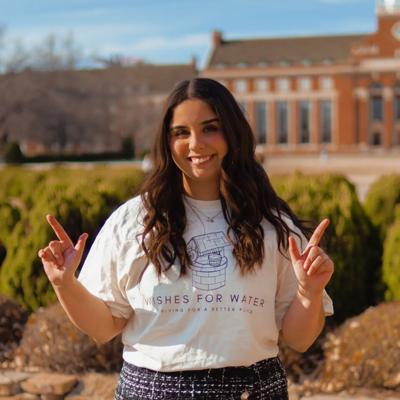
Lily Chavez always knew she’d end up in international development in some form or fashion.
The Weatherford native, now a junior in college, found the perfect fit when she applied — and got accepted — to Oklahoma State’s President’s Leadership Council.
“It’s a development program where you can develop leadership skills, networking … I applied and during the interview, they were talking about a study abroad program in Zimbabwe and looking at ethical leadership and sustainability.”
The university and country share ties through Zimbabwe native Dr. Tererai Trent, who earned her bachelor’s degree at OSU in 2001. Trent has since established her own nonprofit, Tererai Trent International, which aims to further education in her home country through building schools and raising money for women and secondary students to go to college.
The Zimbabwe school system operates much like a private school, and does not receive any funding from the government. Students are charged tuition — about $30 per year per child — to attend.
This past summer, Chavez and her fellow students arrived in Harare, Zimbabwe’s capital about four hours south of the Hurungwe school district where her nonprofit, Wishes for Water, would soon be working.
“It’s completely different,” she said, describing the scene when she first arrived at the airport. “You obviously know it’s going to be different, but you don’t really understand the level of poverty until you’re there.
“Zimbabwe has struggled with its economy since becoming a relatively new country in the 80s and the infrastructure … buildings not up to date, trash — it’s a different world once you step into it.”
Once they arrived in the village, Chavez said is was a completely different understanding from the urban areas.
“There’s nothing for miles … it’s not a typical village, there’s nothing together, the school is far and your neighbors might be a mile or miles apart,” she said. “There’s no water, no actual buildings.”
Aside from the scenes, however, the OSU junior was taken aback by the kind nature displayed from the locals.
“We met a guy in the village who was a polygamist. He had five wives and they had over 36 children,” Chavez said. “This one lady approached us who had pretty much nothing — her only source of food was this bucket of peanuts and she’s offering them to us.
“It’s such a loving community and the running theme that encouraged the trip and my learning experience was, ‘give all that you have to reveal who you are.’
“That’s something I live by now.”
Chavez, who also has a passion for education reform, quickly realized the importance having access to water could have on a school and furthermore, an entire community. Wishes for Water aims to do exactly that, with a current fundraising effort to drum up $15,000 to place wells at a school.
“After we came back from that trip, I felt like we can’t just keep going and seeing things and not bringing anything back, because at that point, you’re just taking,” she said. “It’s kind of crazy for us to think about because we would never imagine a life without water, let alone water in normal places.”
To date, the nonprofit is a little more than halfway to its fundraising goal, and is working side-by-side with Tererai Trent International, who will be choosing the primary school site for the new well.
“Right now, she’s got about 15 schools that she helps in the area, and only two have water,” Chavez said. “Our mission is to raise the money that her organization can’t and be that source of water funding for that area.”
Anyone interested in donating or learning more about the Wishes for Water mission can visit www.wishesforwater.org/. Cash, check, Venmo and CashApp payments are all accepted.
In June, Chavez and her team will return to Zimbabwe to see where they’ll be working and hand over a check to Tererai Trent International. She said she’ll also be implementing a quantitative analysis system of gender representation in schools, tracking current gender rate attendance and reviewing it a year later to see if there are any changes after the water well is installed.
“We’ve seen it in one school, but we didn’t have the analysis to prove it,” Chavez said. “But having water at school means more students … less girls are hauling water and able to attend.
“And it supports the entire community because it’s the only source of water. Without even knowing it, the community is rallying around education.”
–Weatherforddemocrat


